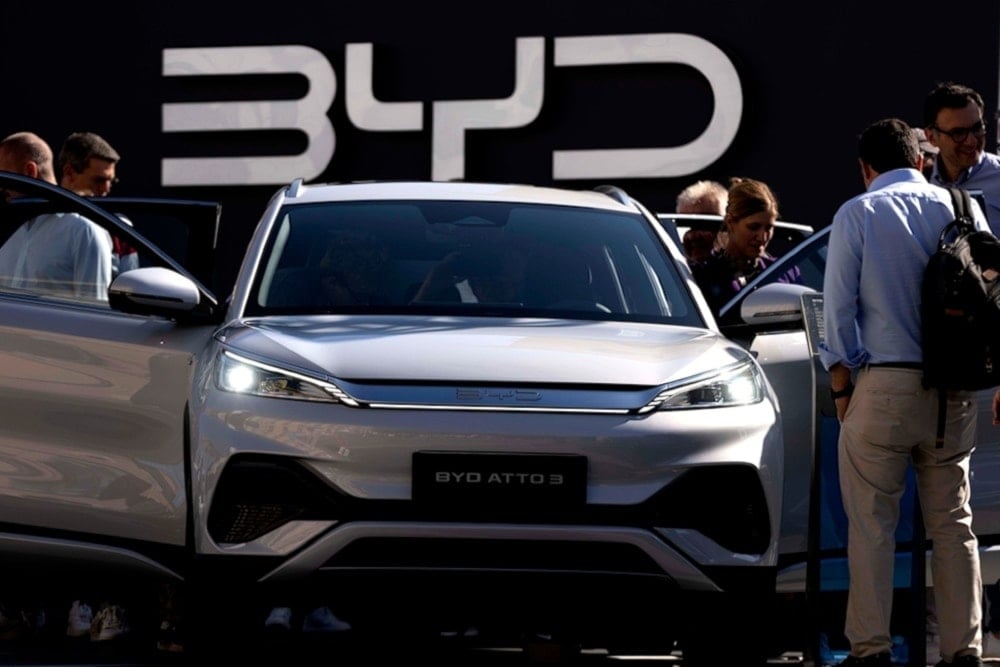EV sales in China to overtake traditional cars ahead of the West: FT
Sales of traditional gasoline-powered cars in China are expected to drop by more than 10% next year, falling below 11 million, a nearly 30% decline from 14.8 million in 2022.
-

Visitors check the China-made BYD ATTO 3 at the IAA motor show in Munich, Germany, on Sept. 8, 2023. (AP)
Electric vehicles (EVs) are expected to surpass cars with internal combustion engines in China for the first time next year, marking a significant turning point that places the world’s largest car market years ahead of Western competitors, the Financial Times reported.
According to the latest estimates from four investment banks and research groups shared with the Financial Times, Chinese EV sales—including pure battery and plug-in hybrids—are projected to grow by around 20% year on year, reaching over 12 million cars in 2025. This would more than double the 5.9 million sold in 2022.
In contrast, sales of traditional gasoline-powered cars are expected to drop by more than 10% next year, falling below 11 million, a nearly 30% decline from 14.8 million in 2022. Meanwhile, EV sales growth in Europe and the US has slowed due to the legacy car industry’s slow adaptation to new technology, uncertainty over government subsidies, and rising protectionism against Chinese imports.
Dive deeper
Robert Liew, director of Asia-Pacific renewables research at Wood Mackenzie, told the Financial Times that China’s EV milestone reflects its success in developing domestic technology and securing global supply chains for critical resources needed for EVs and their batteries.
The industry’s scale has also led to significant manufacturing cost reductions and lower prices for consumers. “They want to electrify everything,” said Liew. “No other country comes close to China.”
While the growth rate of Chinese EV sales has moderated from the post-pandemic boom, forecasts suggest that Beijing’s 2020 target for EVs to make up 50% of car sales by 2035 will be reached 10 years ahead of schedule.
The industry forecasts, provided by investment banks UBS and HSBC, and research groups Morningstar and Wood Mackenzie, suggest that over the next decade, factories established in China to produce millions of traditional-engine cars will find the domestic market nearly nonexistent. They also highlight how the rapid rise of China’s EV sector is now posing a threat to national manufacturing giants in Germany, Japan, and the US.
As China’s EV market heads toward nearly 40% year-on-year growth in 2024, the market share of foreign-branded cars has dropped to a record low of 37%, down from 64% in 2020, according to data from Shanghai-based consultancy Automobility.
In response to this shifting landscape, this month alone, General Motors wrote off more than $5 billion of its business value in China; the holding company behind Porsche warned of a writedown in its Volkswagen stake of up to €20 billion; and rivals Nissan and Honda announced they were merging to address the “drastically changing business environment.”
China's EV market poised for surge
Vincent Sun, an equity analyst at Morningstar covering China’s car sector, said as quoted by FT that several multinational automakers, including Germany’s Volkswagen, do not expect to launch significant new EV models in China until late 2025 or 2026.
HSBC estimated that approximately 90 new car models are planned for release by manufacturers in China in the fourth quarter of 2024, roughly one per day, with nearly 90% of them being EVs.
However, Paul Gong, head of Chinese automotive research at UBS, warned of some uncertainty surrounding China’s broader economic policy as it heads into 2025. He predicted a "weak start to the year" following a strong finish in 2024.
Nevertheless, he added, “We anticipate . . . a strong surge in purchases at the end of 2025, driven by the expiration of subsidies and the imposition of a 5 percent purchase tax on electric vehicles in 2026 — compared to 0 percent until the end of 2025.”

 4 Min Read
4 Min Read








